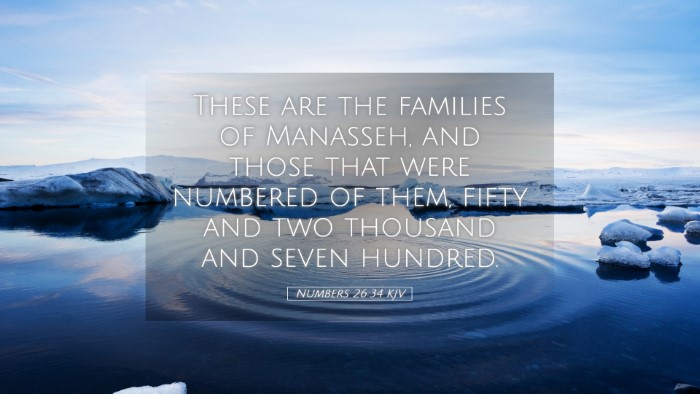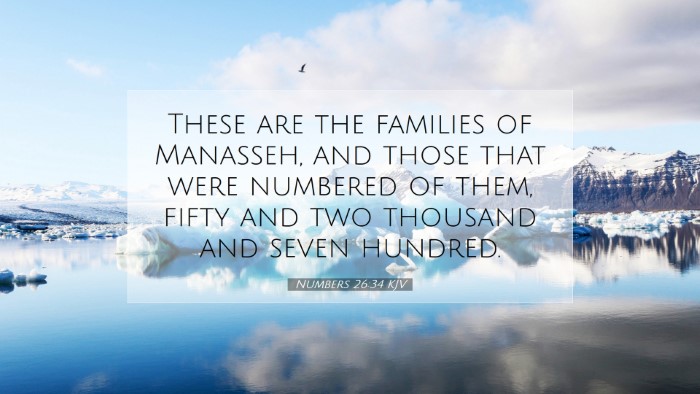Commentary on Numbers 26:34
Numbers 26:34 states: "These are the families of the Manassites; and those that were numbered of them were fifty-two thousand and seven hundred." This verse marks a significant point in the enumeration of the Israelites, especially concerning the tribe of Manasseh. Below is a summary of insights from various public domain commentaries.
1. Context and Significance
Historical Background: The book of Numbers encompasses the journey of the Israelites from Mount Sinai to the Promised Land. This specific chapter is focused on the second census of the Israelites, which God commanded Moses to take. It serves a dual purpose: to record the population for military and logistical purposes and to affirm God's faithfulness to His covenant despite their previous disobedience.
The Tribe of Manasseh: As one of the sons of Joseph, Manasseh represents a significant lineage within the Israelite community. The inclusion of this tribe in the census underscores God's promise to Joseph and the importance of maintaining the tribal identities and records within Israel.
2. Commentary Insights
-
Matthew Henry:
Henry emphasizes the faithfulness of God in keeping His promise of multiplying the descendants of Israel. He remarks on the significance of Manasseh's numbers, portraying it as indicative of God's blessing. Furthermore, Henry believes that the census is not merely a count of people but a declaration of God's providence and sustaining power over His chosen people.
-
Albert Barnes:
Barnes provides an analytical view of the census, noting the implications of being part of the tribe of Manasseh. He asserts that the tribe's substantial number points to the strength and potential military capacity of the Israelites. Barnes also examines the geographical distribution of the tribes following the conquest of Canaan and how census numbers impact land allocation.
-
Adam Clarke:
Clarke explores the importance of such records in maintaining identity and order within the Israelite community. He asserts that the detailed enumeration reflects a God who values each person and their role within the collective. Clarke also notes that these historical records serve as a testament to God's ongoing relationship with Israel and His commitment to their future restoration.
3. Theological Implications
This passage highlights several theological themes:
-
God's Faithfulness:
The Lord's promises to Abraham, Isaac, and Jacob are reiterated through the ongoing generations of Israel. The faithful preservation of these tribes illustrates divine providence.
-
The Value of Each Individual:
The counting of the tribes reflects God's attentiveness to each individual. Each person is significant in the unfolding narrative of salvation and God's plan.
-
Community and Identity:
The delineation of tribes points to the communal aspect of faith in Israel. Each tribe and family unit has its role within the larger body, reinforcing the idea that the community thrives on the participation of all its members.
4. Application for Today
As modern-day believers reflect on Numbers 26:34, several applications emerge:
-
Recognition of Heritage:
Just as the Israelites were reminded of their lineage, contemporary believers should recognize their spiritual heritage and the collective history of the church.
-
Accountability and Service:
This passage encourages each believer to see their role within the broader community of faith and to serve diligently, remembering that every contribution is valuable.
-
Understanding God's Sovereignty:
The enumeration serves as a reminder of God's sovereign hand in history. Today, believers can take comfort in knowing that God is actively involved in the details of their lives.
5. Conclusion
Numbers 26:34 provides a rich tapestry of meaning for pastors, students, theologians, and scholars alike. The insights from public domain commentaries enrich our understanding of this pivotal moment in the Israelites' journey. As we delve deeper into God's Word, let us embrace the themes of faithfulness, community, and divine providence that echo throughout history and continue to resonate in our lives today.


